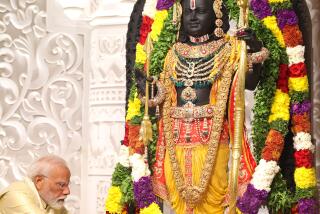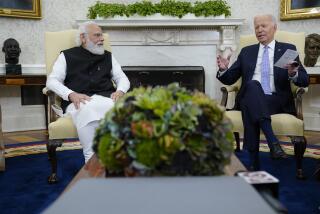Fundamentalism and Unrest in India
- Share via
Paul Johnson’s review of recent history of India and its current political dilemma (“A Democracy Trembles, Fearing Expansionist Islam,” Commentary, Nov. 9) is certainly thought-provoking and timely. I wish to add some perspectives as an Indo-American.
I disagree that India’s submission to Britain was a voluntary one. British colonialism was facilitated by India’s internal divisions and by its self-interested rulers. Poor Sirajuddaula had to fight the advances of Robert Clive’s army (in 1757) without any assistance from other Indian rulers. Even though India experienced an economic exploitation under alien subjugation, British Raj, nevertheless, was a “blessing in disguise.” It exposed its intellectuals to Western ideas. They could overcome their first identity problem--the problem of defining “India” that would cover the whole subcontinent for the first time. The concept of a secular democratic state was an attempt to avoid possible internal conflicts in post-independent India.
Issues of religious and ethnic rights have resurfaced and the legitimacy of secularism is being questioned again. India is going through its second identity crisis. Without any real external enemy, the defenders of the Hindu state are now using its cultural history as a unifying force to externalize its internal weakness.
Former Prime Minister V.P. Singh has done what any committed politician could do. The rest lies in the hands of those who truly understand secular humanism and who would have courage to redefine India’s goals beyond a shattered parliamentary democracy and who would envision participatory democracy, social justice and economic emancipation of all its citizens irrespective of their caste, tribe, religious beliefs or political affiliations. Hopefully, they would also look to a future and not be buried in India’s past.
NIRMAL K. MISHRA, Northridge
More to Read
Sign up for Essential California
The most important California stories and recommendations in your inbox every morning.
You may occasionally receive promotional content from the Los Angeles Times.













